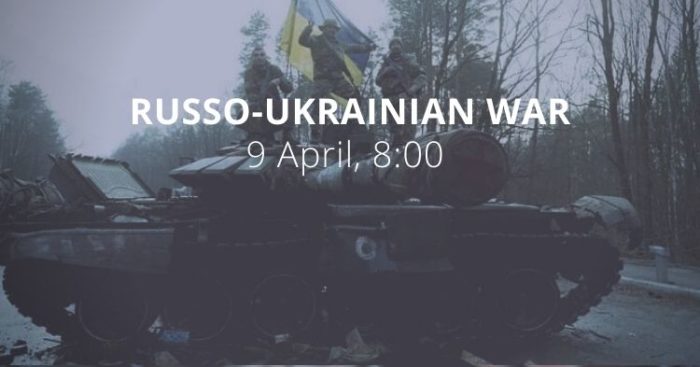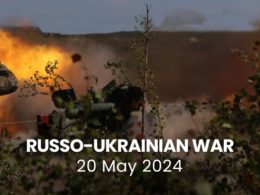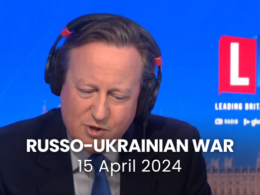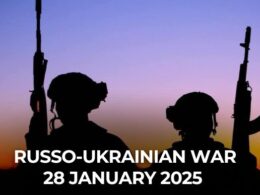Situation
According to information from the General Staff as of 06.00 09.04.2022, supplemented by its [18:00 assessment].“The Russian Federation continues to conduct full-scale armed aggression against Ukraine. The Russian occupiers continue to prepare for the offensive in the east of Ukraine in order to establish full control over the territories of Donetsk and Luhansk oblasts.Ukraine controls most of Mariupol, Ukrainska Pravda reports Friday. "For the second day in a row, the Russians are spreading the news that they have taken control of the city. Sometimes they say that they have taken control of the centre. This is not true. The coastal area, part of the Left Bank in the Azovstal area, the coast from Azovstal to the port, the Port itself, and the areas around the factories remain under Ukrainian control. This is most of the city, says Petro Andryushchenko, an adviser to the mayor.The Russian occupiers continue to destroy civilian infrastructure by launching missile and artillery strikes at railway junctions and roads, stations, residential areas and places of the evacuation of civilians from areas of hostilities. There were no changes in the position and actions of the Russian forces in the Volyn direction. The Russian forces did not take active action in the Polissya direction. Some units that were withdrawn from the territory of Ukraine continue to be located on the territory of the Republic of Belarus. According to available information, in order to regroup troops, the enemy is moving units from the 35th General Army of the Eastern Military District and the 76th Assault Division of the Airborne Forces of the Russian Armed Forces in the Belgorod and Voronezh regions. In the Siversky direction, the Russian forces completed the regrouping of forces and the restoration of combat capability of units of the Central Military District in the Bryansk and Kursk regions, as well as the relocation of individual units from the 41st General Army and 90th Tank Division to Donetsk and Luhansk oblasts. In the Slobozhansky direction, the Russian forces continue intense shelling and partial blockade of the city of Kharkiv using artillery, including multiple rocket launchers and large-calibre mortars. It strengthens electronic intelligence. In the Belgorod region, the Russian forces set up field camps for units relocated from other operational areas.
The Russian forces continue to storm in the Donetsk direction. The main efforts are focused on taking control of the settlements of Rubizhne, Nyzhne, Popasna and Novobakhmutivka and establishing full control over the city of Mariupol.
- The Russian occupiers completely withdrew their troops from the Sumy region to the Russian federation.
- In the Izium direction, the enemy launched an offensive in the direction of the settlements of Brazhkivka and Sulyhivka but had no success.
In the Pivdennyi Buh direction, the Russian forces intensified reconnaissance. It carried out artillery shelling of the settlements of Maryanske, Novovorontsovka, Novohryhorivka and Shevchenkove. Continues to launch missile strikes on settlements of the Odesa oblast from the territory of the Crimean peninsula.
- The Russian forces continue to increase the number of troops.
- In the territory of Donetsk and Luhansk oblasts, defenders of Ukraine repulsed seven Russian enemy attacks and destroyed nine tanks, seven armored units and five units of enemy vehicles.
🔸On the morning of 8 April, the Russian troops killed an entire family in Avdiivka, Donetsk Obl.
— Euromaidan Press (@EuromaidanPress) April 8, 2022
🇷🇺 shelling of Avdiivka, the 🇺🇦-controlled Donetsk suburb, killed four people, according to Head of Donetsk Regional Administration Pavlo Kyrylenko
📷https://t.co/SkNAhb9tbf pic.twitter.com/3lrb2We04i- The Russian occupying authorities in the temporarily occupied territory of Donetsk 0blast have received instructions from Russian curators to return to these territories people who left for the Russian Federation in January-February 2022. According to the instructions of local administrations, citizens must return to the settlements at the place of registration/residence after two months of stay in Russia.
Operational Command “South” states that “the enemy continues to conduct defensive operations along the occupied frontier in the Mykolayiv and Kherson directions. He tries to regain his strength and get back into battle.
- In the Pivdennobuzhsky direction, the Russian forces fought in the area of the settlement of Oleksandrivka. Russian forces tried to inflict damage on units of the Armed Forces of Ukraine in the area but did not reach the goal.
The Air Force of the Armed Forces of Ukraine has hit four air targets the previous day: two helicopters, one UAV and one cruise missile. The information is currently being clarified.“
- Under heavy artillery fire, our servicemen continue to defend the recaptured settlements of the Kherson region, even managing to capture a BTR-80 and destroy 3 Orlan-10 unmanned aerial vehicles. In just one day in the south of Ukraine alone, Russian forces lost 43 soldiers and 12 units of equipment.
- The Russian naval group in the Black Sea continues reconnaissance operations and an active blockade of Ukrainian ports. The enemy launched 2 missile strikes on the Kirovohrad and Odesa oblasts from the Black Sea. In both cases, critical infrastructure was targeted. Fortunately, there were no casualties.”
It will take Russia as much as a month to regroup for a major push on eastern Ukraine a Western official, speaking on condition of anonymity said, the Military Times reports.Azov Regiment defending Mariupol shows how it took down a Russian IFV with crew
— Euromaidan Press (@EuromaidanPress) April 8, 2022
According to advisor to Mayor, most of Mariupol, including the coast and surroundings of Azovstal, remains under the control of Ukrainian defenderspic.twitter.com/BwCLNecwl9
“Almost a quarter of its battalion tactical groups in the country have been rendered “non-combat-effective” and have either withdrawn or merged with other units, the official said.”Recent data on selection for military service in Russia indicate a low level of Russian interest in contract service, the Defence Intelligence of Ukraine (DIU) claims. According to a report on the results of recruiting in the city of Ekaterinburg, even less than 1% of citizens in reserve agreed to talk about the possibility of signing a contract. A unit of Russian special forces with experience in hostilities in Syria, in full, refused to participate in further attempts to storm Mariupol. In the battles against the Armed Forces from April 2 to 4, this unit lost about 30 servicemen. There is also extremely low morale among those already mobilized. In particular, on March 7, two PAZ buses with wounded Russian servicemen were sent from the Novoaidar Polyclinic in the direction of Luhansk. It is noted that the vast majority of them have leg injuries. According to doctors, the most probable cause of these injuries is self-mutilation to avoid returning to the combat zone. During the last 24 hours, the Ukrainian General Staff has reported on the Russian manning and logistic challenges:
The Russian forces have significant problems with the recruitment of military units that suffered significant losses during hostilities in Ukraine. According to available information, more than 80 percent of the Russian personnel of some units involved in the war do not want to take part in further hostilities. The commanders of the occupying Russian forces of the occupiers forbade the release of servicemen whose contracts had expired before the end of the so-called "special military operation".According to British Defence Intelligence, (last 24 hours):
- Russia continues to hit Ukrainian non-combatants, such as those killed in yesterday’s rocket strike on the Kramatorsk railway station in eastern Ukraine.
- Russian operations continue to focus on the Donbas region, Mariupol, and Mykolaiv, supported by continued cruise missile launches into Ukraine by Russian naval forces.
- Russian air activity is expected to increase in the south and east of Ukraine in support of this activity.
- However, Russian ambitions to establish a land corridor between Crimea and the Donbas continue to be thwarted by Ukrainian resistance.
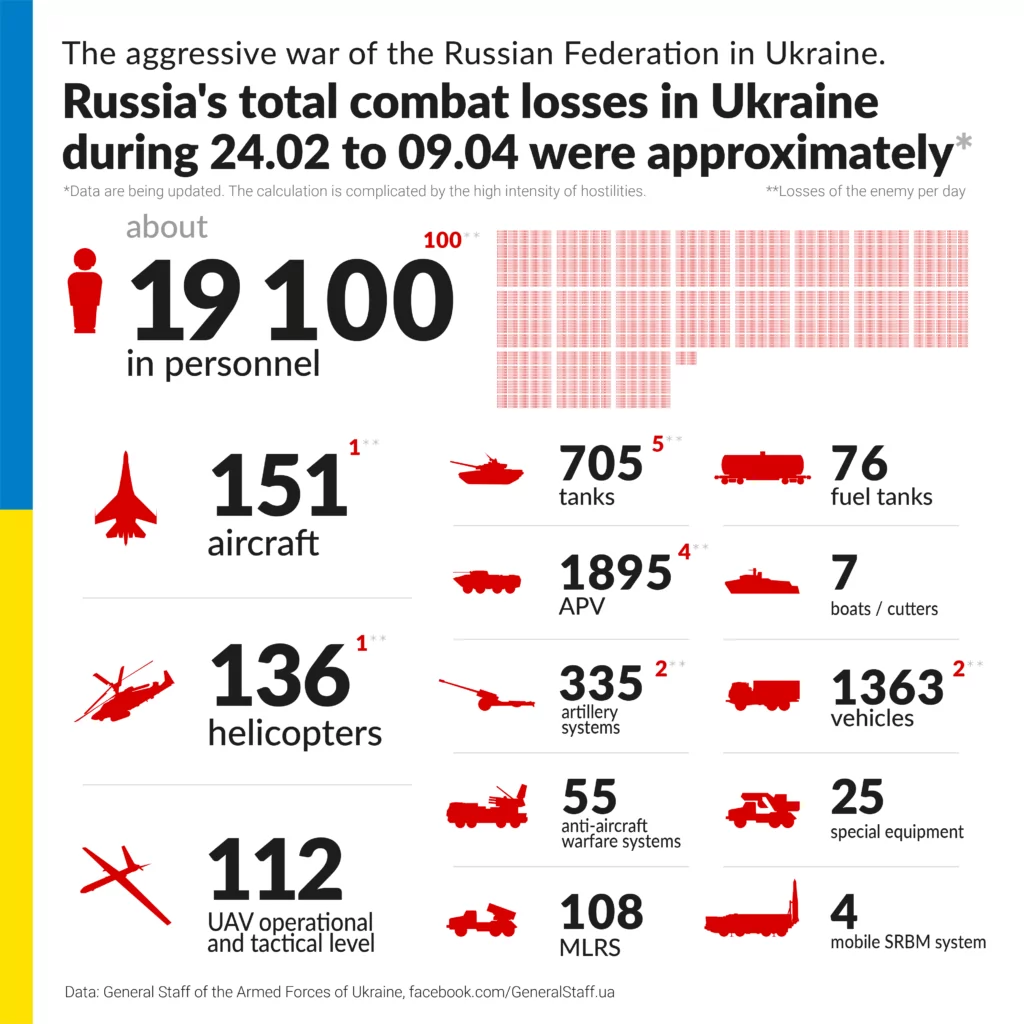
- personnel – more than 19100 people (+100),
- tanks – 705 units (+5),
- armored combat vehicles – 1895 units (+4),
- artillery systems – 335 (+2),
- multiple rocket launchers – 108 (no change)
- air defense means – 55 (no change),
- aircraft - 151 (+1),
- helicopters - 136 (+1),
- automotive technology – 1363 (+2),
- vessels/boats - 7 units (no change),
- fuel and lubricant tanks – 76 (no change),
- UAV operational and tactical level – 112 (no change)
- Special equipment – 25 (no change)
- Mobile SRBM system – 4 (no change)
Humanitarian
According to UNHCR 4,382,316 refugees have been registered as of April 7. The UN says that so far Poland has taken in 2,537,769 refugees, Romania 671,334, Hungary 408,652, Republic of Moldova 404,257, Russia 373,589, Slovakia 307,772 and Belarus 19,096. Among those who fled Ukraine are also Ukrainian nationals with dual citizenship. An additional 113,000 people moved to the Russian Federation from the Donetsk and Luhansk regions between 21 and 23 February. OHCHR recorded 3,893 civilian casualties in Ukraine as of midnight of April 7. 1,626 were killed (including 132 children) and 2,267 injured (including 207 children). 176 children were killed, and 324 children injured - Office of the Prosecutor General of Ukraine reports that as of April 9. Agreed humanitarian corridors allowed for the evacuation of 6,665 people on 8 April. According to the Deputy Prime Minister and Minister of Reintegration of Temporarily Occupied Territories of Ukraine:“In total, almost 6.7 thousand citizens were evacuated during the day as of 10 p.m., the official stated. The corridor from Mariupol and Berdiansk was used by 5,158 citizens: they took their own transport and evacuation buses to Zaporizhzhia. Among them: 1 614 - from Mariupol; 3,544 - from the cities of the Zaporizhzhia Oblast (Polohy, Vasylivka, Berdiansk, Tokmak, Melitopol, Energodar, Orikhiv, Hulyaypole. At the same time, in Melitopol, the occupiers have been holding 8 evacuated buses for evacuation for 24 hours. We are negotiating to return these buses and provide an opportunity - in accordance with the agreements - to evacuate local residents" - said Irina Vereshchuk. From the cities: Lysychansk, Sievierodonetsk, Rubizhne, Kreminna and the village of Hirske, Luhansk Oblast - today 1,507 people were evacuated.”
Legal
Facial Recognition Goes to War, The New York Times reports. Services that put a name to a face, including Clearview AI, are being used to identify Russian soldiers, living or dead, and to verify that travelers in Ukraine are who they claim.“In the weeks after Russia invaded Ukraine and images of the devastation wrought there flooded the news, Hoan Ton-That, the chief executive of the facial recognition company Clearview AI, began thinking about how he could get involved. […] The app “can instantly identify someone just from a photo” that the police and federal agencies in the United States use it to solve crimes. […] The tool, which can identify a suspect caught on surveillance video, could be valuable to a country under attack, Mr Ton-That wrote. He said the tool could identify people who might be spies, as well as deceased people, by comparing their faces against Clearview’s database of 20 billion faces from the public web, including from “Russian social sites such as VKontakte.” Mr Ton-That decided to offer Clearview’s services to Ukraine for free, as reported earlier by Reuters. Now, less than a month later, the New York-based Clearview has created more than 200 accounts for users at five Ukrainian government agencies, which have conducted more than 5,000 searches. Clearview has also translated its app into Ukrainian. [...] Identifying dead soldiers and notifying their families is part of a campaign, according to a Telegram post by the Ukrainian vice prime minister Mykhailo Fedorov, to break through to the Russian public the cost of the conflict and to “dispel the myth of a ‘special operation’ in which there are ‘no conscripts’ and ‘no one dies,’” he wrote.”Several dozen nonprofit organizations joined their efforts in a global initiative “Breaking the Vicious Circle of Russia’s Impunity for Its War Crimes” (“Tribunal for Putin” in short) and have already documented and recorded 1188 incidents as war crimes committed by Russia in the territory of Ukraine in the joint database, Center for Civil Liberties states.
“These incidents record at least 414 cases of loss of life, 392 cases of injuries, 868 cases of shelling and bombing, 559 attacks on civilian objects, and 349 cases of property destruction or damaging. The systematic nature and large scale of war crimes signify that Russia uses war crimes as a warfare tactic. These acts cannot be justified by military goals and constitute grave breaches of international humanitarian law.”5337 crimes of aggression and war crimes, and 2607 crimes against national security were registered as of April 9. 928 educational establishments are damaged as a result of shelling and bombings, 84 of which are destroyed fully.
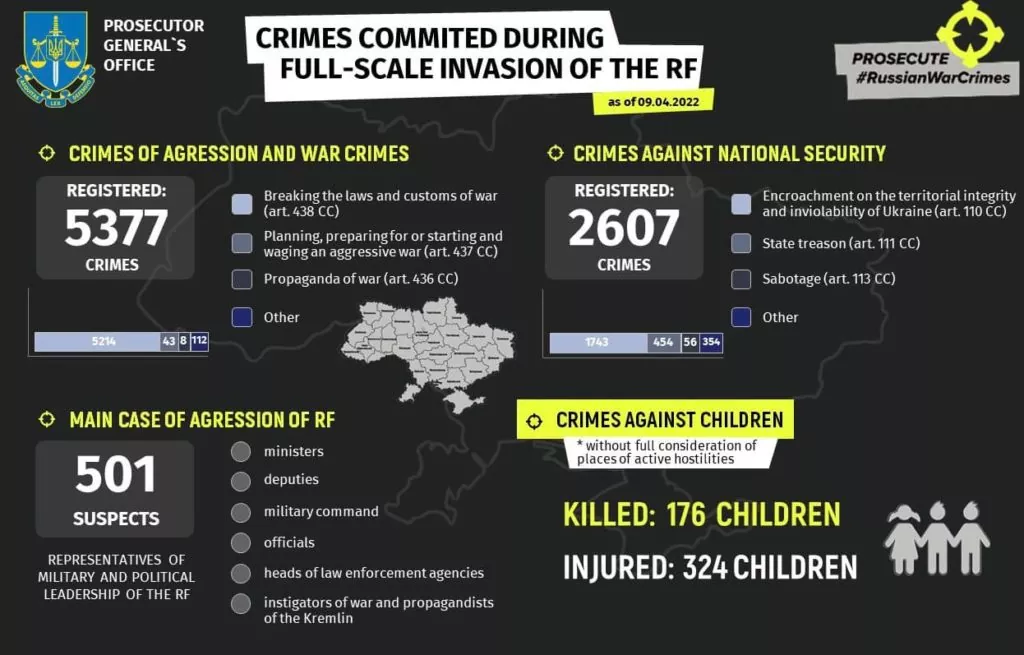 According to the General Staff, the Russian forces continue to violate international humanitarian law by committing illegal acts against civilians, including looting, theft of vehicles, and detention of Ukrainian citizens in the temporarily occupied territories.
According to the General Staff, the Russian forces continue to violate international humanitarian law by committing illegal acts against civilians, including looting, theft of vehicles, and detention of Ukrainian citizens in the temporarily occupied territories.
Support
Slovakia sends S-300 air defense system to Ukraine, Ukrinform reports. Slovakia's Prime Minister Eduard Heger has confirmed that his country has provided an S-300 air defense system to Ukraine against Russia's aggression. "I can confirm that the Slovak Republic, following Ukraine's request for assistance in ensuring self-defense under Article 51 of the UN Charter, as a direct consequence of armed aggression by the Russian Federation, has donated an S-300 air defense system to Ukraine," he wrote. Boris Johnson announces more weapons for Ukraine, BBC reports. Boris Johnson has announced £100m worth of weapons for Ukraine after the "unconscionable bombing" of refugees at a railway station. The prime minister said the UK will send additional military equipment including Starstreak anti-aircraft missiles and 800 anti-tank missiles. How Germany Became Putin’s Enabler, is the headline of an op-ed published by The New York Times argues that“Vladimir Putin’s war of aggression runs on the money Russia gets by selling fossil fuels to Europe. And while Ukraine has, incredibly, repelled Russia’s attempt to seize Kyiv, Putin won’t be definitively stopped until Europe ends its energy dependence. Which means that Germany — whose political and business leaders insist that they can’t do without Russian natural gas, even though many of its own economists disagree — has in effect become Putin’s prime enabler. This is shameful; it is also incredibly hypocritical given recent German history. […]And maybe, maybe, the realization that refusing to shut off the flow of Russian gas makes Germany de facto complicit in mass murder will finally be enough to induce real action. But until or unless this happens, Germany will continue, shamefully, to be the weakest link in the democratic world’s response to Russian aggression.”The article is very much worth reading, and echoes the sentiments of the article “The German Government’s Hesitance over the War Is Angering Allies” in the Spiegel, highlighting that “Berlin is constantly signally its vulnerability to Moscow, and that’s the last thing Europe needs right now”. To be fair, however, while the author rightfully hangs out Germany to dry, it must be stressed that Germany is only one out of many NATO members that have exercised extreme cynicism in the last 8 years. Germany has so far delivered a substantial amount of defense aid to Ukraine, the Spiegel reports. An updated list published on Thursday includes 500 Stinger anti-aircraft missiles, 2,700 Strela surface-to-air missiles from former East German stocks, 3,000 anti-tank guns, 100 MG 3 machine guns, 16 million rounds of ammunition for various types of hand-held weapons and hundreds of anti-tank mines, 80 armored all-terrain vehicles, 50 medical Unimog trucks, 14 pallets of medical supplies, half a million one-man packs of rations, four drone defense systems, plus night vision equipment and binoculars. Australia announces more military aid for Ukraine, AA reports. Australia on Friday announced a further $26.5 million in military aid for Ukraine. A statement issued from Prime Minister Scott Morrison's office said the anti-armor weapons will further boost the capabilities of Ukrainian forces. "This extra support comes on top of the 20 Bushmaster Protected Mobility Vehicles we announced today that our Government is gifting the Government of Ukraine," said Morrison in a joint statement with his defense minister. US Cyber Command reinforces Ukraine and allies amid Russian onslaught, C4ISTnet reports. US Cyber Command has played a pivotal role in shielding networks and critical infrastructure stateside and abroad in the run-up to and during Russia’s attack on Ukraine, its leader told Congress this week. In Ukraine, specifically, Cyber Command has provided remote analytic support and conducted network defense activities, Gen. Paul Nakasone testified. Intelligence agencies accelerate the use of commercial space imagery to support Ukraine, C4ISRnet reports. Since before Russia invaded Ukraine, space imagery, remote sensing, and communications satellites have been helping keep Ukrainian forces and civilians connected. NGA also tapped its testing pipeline for commercial synthetic aperture radar and pushed it directly into operations months earlier than planned. SAR satellites, unlike electro-optical sensors that can struggle to see in the dark or harsh conditions, can provide imagery at nighttime and through adverse weather conditions. David Gauthier, director of commercial and business operations at the National Geospatial-Intelligence Agency, and his team coordinated private efforts to directly connect analysts in Ukraine with companies, facilitating a much faster link for providing services. EU agrees on the fifth package of restrictive measures against Russia on Friday. The measures include an import ban on all forms of Russian coal. A full transaction ban and asset freeze on four Russian banks and a prohibition on providing high-value crypto-asset services to Russia. A full ban on Russian and Belarusian freight road operators working in the EU and an entry ban on Russian-flagged vessels to EU ports. Exemptions apply for medical, food, energy, and humanitarian purposes, amongst others. Further targeted export bans – worth €10 billion - in areas in which Russia is vulnerable due to its high dependency on EU supplies. Additional import bans – worth €5.5 billion - including cement, rubber products, wood, spirits (including vodka), liquor, high-end seafood (including caviar), and an anti-circumvention measure against potash imports from Belarus. These measures will also help to close loopholes between Russia and Belarus. And lastly, excluding Russia from public contracts and European money. EU facilitates coordinated steps by telecom operators to help refugees stay connected, European Commission states in a press release. At a virtual event Friday,
“telecom operators based in the EU and Ukraine have signed a joint statement on their coordinated efforts to secure and stabilise affordable or free-roaming and international calls between the EU and Ukraine. The Commission and the European Parliament have facilitated this joint statement and welcome its signature by 27 operators, with more joining, in the EU and Ukraine, including several EU-wide groups, and the association representing several mobile virtual network operators (MVNO Europe).”EU disburses €120 million grant for Ukraine to support societal and state resilience, European Commission says in a press statement.
“On the occasion of the visit of President Ursula von der Leyen together with High Representative/Vice-President Josep Borrell Fontelles today in Kyiv, the European Commission announced the disbursement of a €120 million grant for Ukraine to assist the government in strengthening civilian crisis preparedness and management at central and local levels.”Due to inflation and sanctions in Russia, the execution of the Military Orders is delayed, the Defence Intelligence of Ukraine (DIU) claims. Russian companies are facing serious problems in fulfilling military orders. The inflation caused by the international sanctions "eats" the funds provided for the production of weapons. Additional funds in the budget of the Russian Federation are absent.
New developments
- Condemning Bucha cruelty, EU offers speedy start for Ukraine membership, Reuters European Commission chief Ursula von der Leyen said the civilian deaths in the Ukrainian town of Bucha showed the "cruel face" of Russia's army and pledged to try to speed Ukraine's bid to become a member of the European Union. Saying the EU could never match the sacrifice of Ukraine, von der Leyen offered it a speedier start to its bid for bloc membership.
- Russia says Ukraine presented an 'unacceptable' draft peace deal, Euronews According to the Kremlin talks with Ukraine are not progressing as rapidly as they would like and accuses the West of trying to derail negotiations by raising war crimes allegations against Russian troops in Ukraine. Lavrov said on Thursday that Ukraine had presented a draft agreement on Wednesday that deviated from proposals both sides’ negotiators had agreed on. Ukraine’s new draft said the status of Crimea should be raised at a meeting between the two presidents. It also said Ukraine could hold military drills with foreign countries without receiving Russia’s permission, something Moscow disagrees with. Kyiv says it is committed to the talks but is not willing to give up its sovereignty and territorial integrity.
- S&P cuts Russia's foreign currency rating to 'selective default', Reuters S&P on Saturday lowered Russia's foreign currency ratings to "selective default" on increased risks that Moscow will not be able and willing to honor its commitments to foreign debtholders. “Facing waves of sanctions over its invasion of Ukraine, Russia could face its first sovereign external default in over a century after it made arrangements to make an international bond repayment in rubles this week, even though the payment was due in dollars.”
- The self-proclaimed President of Belarus, Alexander Lukashenko, and his government have approved a list of countries that are "hostile to the republic", Ukrainska Pravda The list includes 12 countries and the entire European Union. Ukraine is, however, not on the list.
- Medvedev called the international sanctions an act of aggression, Ukrainska Pravda:
"Sanctions in the current situation can be described as an act of aggression against the Russian Federation, as a form of hybrid war. In this case, Russia has the right to individual and collective defence under national law and international law. On March 26, Medvedev said that Russia could use nuclear weapons in four cases, one being "an act of aggression against Russia or its allies, which would jeopardize the existence of the country."
Assessment
On the War
The Institute for the Study of War has made the following assessment as of Friday 08 April:“Ukrainian forces retain control of defensive positions in eastern and southwestern Mariupol, despite Russian claims to have captured most of the city. ISW was able to confirm the specific locations of ongoing Russian assaults on April 8 for the first time in several days. Russian forces continue to attempt to regroup and redeploy units withdrawn from northeastern Ukraine to support an offensive in eastern Ukraine, but these units are unlikely to enable a Russian breakthrough and face poor morale. Russian forces along the Izium-Sloviansk axis did not make any territorial gains in the last 24 hours. Ukrainian counterattacks toward Kherson continue to threaten Russian positions around the city.
Key Takeaways
- Ukrainian forces continued to hold out against Russian assaults in areas of southwestern and eastern Mariupol, notably in the port and the Azovstal Metallurgy plant, respectively.
- Ukrainian forces continued to repel daily Russian assaults in Donetsk and Luhansk Oblasts.
- A Russian Tochka-U missile struck a civilian evacuation point at the Kramatorsk rail station in eastern Ukraine, killing at least 50 and wounding around a hundred evacuees.
- Russian forces continued attacks south of Izium toward Sloviansk and Barvinkove but did not take any new territory.
- Ukrainian counterattacks have likely taken further territory west of Kherson, threatening Russian control of the city.“
“Speaking to the BBC's Gordon Corera on condition of anonymity, the source said the commander of Russia’s southern military district, Gen Alexander Dvornikov, now leads the invasion. “That particular commander has a lot of experience of operations of Russian operations in Syria. So we would expect the overall command and control to improve,” the source said. The new instatement was done in an attempt to improve coordination between various units, as Russian groups had previously been organised and commanded separately, the official said. Russia has so far struggled to achieve its war aims 44 days into the invasion, failing to capture major cities such as Kyiv before eventually turning its sights to the Donbas region in the east. The official said Russian tactics had seen them held back by smaller numbers of Ukrainian units acting more intelligently and with surprise - despite Russia being thought to have a "substantial" force of slightly fewer than 100 operational battalion tactical groups, “Unless Russia is able to change its tactics, it's very difficult to see how they succeed in even these limited objectives that they've reset themselves," the official said. The official added political imperatives might take precedence over military priorities, with Russia pushing forward to get some kind of success ahead of 9 May, when the country marks victory in World War Two.”

